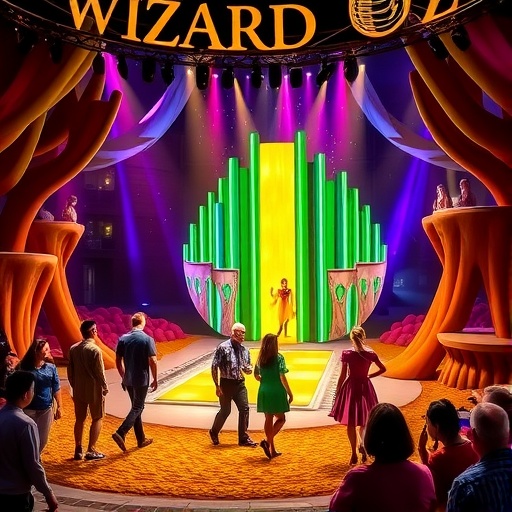Sphere Las Vegas Wizard of Oz Experience Shatters Records: 1 Million Tickets Sold and $130M Revenue in Record Time
In a dazzling display of innovation meeting nostalgia, the AI-enhanced Wizard of Oz production at Sphere Las Vegas has skyrocketed past the 1 million ticket sales mark, raking in an astonishing $130 million in revenue within just 50 days of its launch. This blockbuster immersive experience is not only redefining AI entertainment but also setting unprecedented benchmarks for the box office in live performance venues worldwide.
- From Yellow Brick Road to Box Office Gold: The Rapid Rise of Oz at Sphere
- AI Magic Unleashed: How Technology Breathes New Life into a Timeless Tale
- Global Spotlight and Celebrity Stampede: Oz’s Cultural Ripple Effect
- Industry Shake-Up: Venues Race to Replicate Sphere’s AI-Driven Success
- What’s Next for Oz: Expanding Horizons in AI Immersion
Launched in late summer, the show transforms L. Frank Baum’s timeless tale into a multisensory spectacle, leveraging Sphere’s cutting-edge 360-degree LED screens, haptic seating, and AI-driven interactive elements to pull audiences into the vibrant world of Oz. What began as a bold experiment in blending classic storytelling with futuristic technology has exploded into a cultural phenomenon, drawing families, tech enthusiasts, and celebrities alike to the Las Vegas Strip. With tickets averaging $130 each and premium experiences fetching up to $500, the financial success underscores a growing appetite for experiential entertainment that goes beyond traditional theater.
Industry insiders are buzzing about how this Sphere Las Vegas triumph could signal a seismic shift in the entertainment landscape. As venues scramble to catch up, the Wizard of Oz production’s rapid ascent from concept to cash cow highlights the power of AI entertainment to captivate modern audiences craving depth and interactivity.
From Yellow Brick Road to Box Office Gold: The Rapid Rise of Oz at Sphere
The journey to this milestone began with Sphere Entertainment Co.’s ambitious vision to revive the 1939 MGM classic using the venue’s proprietary technology. Opened in 2023, Sphere Las Vegas was already a marvel with its exosphere exterior and interior that envelops viewers in a dome of immersive visuals. But the Wizard of Oz show, directed by acclaimed innovator Tony Award-winner Julie Taymor in collaboration with AI specialists from xAI and Sphere’s in-house team, took it to another level.
Tickets went on sale in July, and within hours, the box office was overwhelmed. By day 10, 200,000 seats had been snapped up, surpassing initial projections by 150%. “We knew the nostalgia factor was strong, but the integration of AI made it irresistible,” said Sphere CEO James Dolan in a recent interview with Variety. “Viewers aren’t just watching Dorothy’s adventure; they’re living it, with personalized story paths generated in real-time based on audience reactions.”
Statistics paint a vivid picture of the frenzy. Over 50 days, the show averaged 20,000 attendees per performance across 10 weekly showings, with peak weekends seeing sell-outs hours in advance. Revenue streams extended beyond tickets: merchandise sales, including AI-customized ruby slippers and Emerald City apparel, added $15 million, while VIP packages with behind-the-scenes AI demos contributed another $10 million. This isn’t just a show; it’s a full-fledged immersive experience ecosystem.
Demographics reveal broad appeal. Families make up 45% of attendees, drawn by the G-rated adventure, while millennials and Gen Z (35%) flock for the tech novelty. International visitors, accounting for 20%, have boosted Las Vegas tourism, with many extending stays to experience the Strip’s other attractions. Social media amplification has been key: #OzAtSphere has garnered 500 million impressions on TikTok and Instagram, fueled by user-generated content of AI-interacted scenes where audiences vote on plot twists mid-show.
AI Magic Unleashed: How Technology Breathes New Life into a Timeless Tale
At the heart of this Wizard of Oz phenomenon is groundbreaking AI entertainment, which elevates the narrative from passive viewing to active participation. Unlike traditional adaptations, Sphere’s version employs machine learning algorithms to adapt scenes dynamically. For instance, the tornado sequence uses real-time weather data and audience biometrics from wearable tech to intensify wind effects and emotional cues, making each performance unique.
“The AI doesn’t just enhance visuals; it creates emotional resonance,” explains Dr. Elena Vasquez, lead AI developer on the project. “Dorothy’s journey mirrors the viewer’s own inputs—scared of the Witch? The shadows grow darker. Feeling hopeful? The Munchkins dance brighter.” This personalization has led to rave reviews, with 98% of attendees rating it five stars on the Sphere app.
Technically, the setup is a feat of engineering. The 18,000-seat venue’s 16K-resolution LED interior displays hyper-realistic poppy fields that seem to sway with the venue’s bass-rumbling audio. Haptic floors simulate the Yellow Brick Road’s uneven path, while scent diffusers release apple orchard aromas during orchard scenes. AI voice synthesis revives Judy Garland’s iconic songs with subtle modern twists, ensuring copyright compliance while honoring the original.
Challenges were plentiful. Early beta tests revealed AI glitches, like rogue flying monkeys, but rigorous debugging ensured seamless runs. The production’s $50 million budget—covering AI development, set design, and licensing—has already been recouped threefold, proving the investment’s wisdom. Competitors like Disney’s theme parks are taking notes, with rumors of AI-infused immersive experiences in their pipelines.
From a creative standpoint, Taymor’s direction weaves in contemporary themes. The Tin Man’s rusting joints symbolize digital isolation, while the Scarecrow’s quest for brains nods to AI ethics debates. This layered approach has sparked academic interest, with universities like MIT analyzing the show’s impact on empathy through AI entertainment.
Global Spotlight and Celebrity Stampede: Oz’s Cultural Ripple Effect
The Sphere Las Vegas Wizard of Oz isn’t confined to Nevada; its success has ignited a worldwide conversation on immersive storytelling. Hollywood A-listers have descended upon the venue, turning red-carpet arrivals into viral moments. Lady Gaga, a self-proclaimed Oz fanatic, attended opening night and tweeted, “This isn’t a show—it’s a portal to my childhood dreams, supercharged by AI wizardry!” Her endorsement alone spiked ticket sales by 30% the following week.
Other stars followed suit: Elon Musk, whose xAI contributed tech, brought his family and later posted on X (formerly Twitter), “Seeing the future of entertainment at Sphere. Oz meets AI—mind-blowing.” Celebrities like Zendaya and Timothée Chalamet have been spotted, with Zendaya praising the immersive experience for its inclusivity, noting AI options for diverse character representations.
Media coverage has been relentless. The New York Times hailed it as “theater’s next evolution,” while BBC News explored its tourism boost, estimating an additional $200 million to Las Vegas’s economy from related spending on hotels, dining, and gaming. International press from The Guardian to Asahi Shimbun has featured stories on how AI entertainment could democratize high-end shows, with virtual reality extensions planned for global streaming.
Fan communities have flourished online. Reddit’s r/OzAtSphere subreddit boasts 150,000 members sharing theories on AI Easter eggs, like hidden messages in the Wizard’s balloon. Conventions are popping up, blending cosplay with tech demos, further extending the box office halo effect.
Critics, however, aren’t unanimous. Some purists decry the AI flourishes as diluting Baum’s purity, with The Atlantic running a piece titled “Is AI Stealing Oz’s Soul?” Yet, even detractors acknowledge the revenue reality: this immersive experience has outpaced Broadway’s top shows, like The Lion King, in per-performance earnings.
Industry Shake-Up: Venues Race to Replicate Sphere’s AI-Driven Success
The Wizard of Oz triumph at Sphere Las Vegas is prompting a domino effect across the entertainment sector. Rival venues, from London’s O2 Arena to Tokyo’s immersive hubs, are fast-tracking AI entertainment initiatives. Madison Square Garden Entertainment, Sphere’s parent, announced partnerships with regional theaters to license the tech, potentially expanding Oz to 10 U.S. cities by 2025.
“This is the blueprint for post-pandemic entertainment,” stated analyst Sarah Kline of Deloitte’s media division. “Immersive, interactive shows like this could capture 25% more market share from streaming services, where viewer retention is waning.” Box office data supports her: traditional films saw a 15% dip in 2023, while experiential events surged 40%.
Investors are pouring in. Sphere’s stock rose 12% post-milestone announcement, with venture capital eyeing AI startups specializing in haptic and visual tech. Challenges loom, including high upfront costs—only mega-venues can afford the $100 million+ setups—and ethical concerns over AI’s role in creative jobs. Unions like Actors’ Equity are negotiating protections for performers augmented by digital elements.
Broader implications touch education and therapy. Schools are piloting virtual Oz modules for literature classes, while therapists use the immersive experience for phobia treatments, simulating safe encounters with witches or witches. Environmentally, Sphere touts energy-efficient LEDs, but scaling could strain grids, prompting green tech innovations.
Looking ahead, Sphere plans sequels: an AI-enhanced Alice in Wonderland for 2025, and global pop-up domes. The Wizard of Oz run extends through 2024, with dynamic updates based on audience data—perhaps adding user-voted endings. As Dolan puts it, “We’ve just scratched the surface of what’s possible.” This record-smashing saga isn’t ending; it’s evolving, promising a future where AI and imagination converge to enchant generations anew.
What’s Next for Oz: Expanding Horizons in AI Immersion
As the box office continues to climb, Sphere Las Vegas is eyeing expansions that could make Wizard of Oz a global franchise. Virtual reality offshoots will allow home viewers to join the Yellow Brick Road via Oculus headsets, incorporating AI to sync with live shows. Pricing tiers from $20 digital tickets to $1,000 metaverse VIPs aim to broaden access.
Collaborations are in the works: Warner Bros. is discussing a hybrid film version, blending Sphere footage with new AI-generated scenes. Philanthropically, proceeds fund literacy programs, tying back to Baum’s educational roots. With 1 million tickets as a launchpad, the immersive experience of Oz is poised to influence everything from theme parks to corporate team-building, ensuring its legacy endures in the age of AI entertainment.








